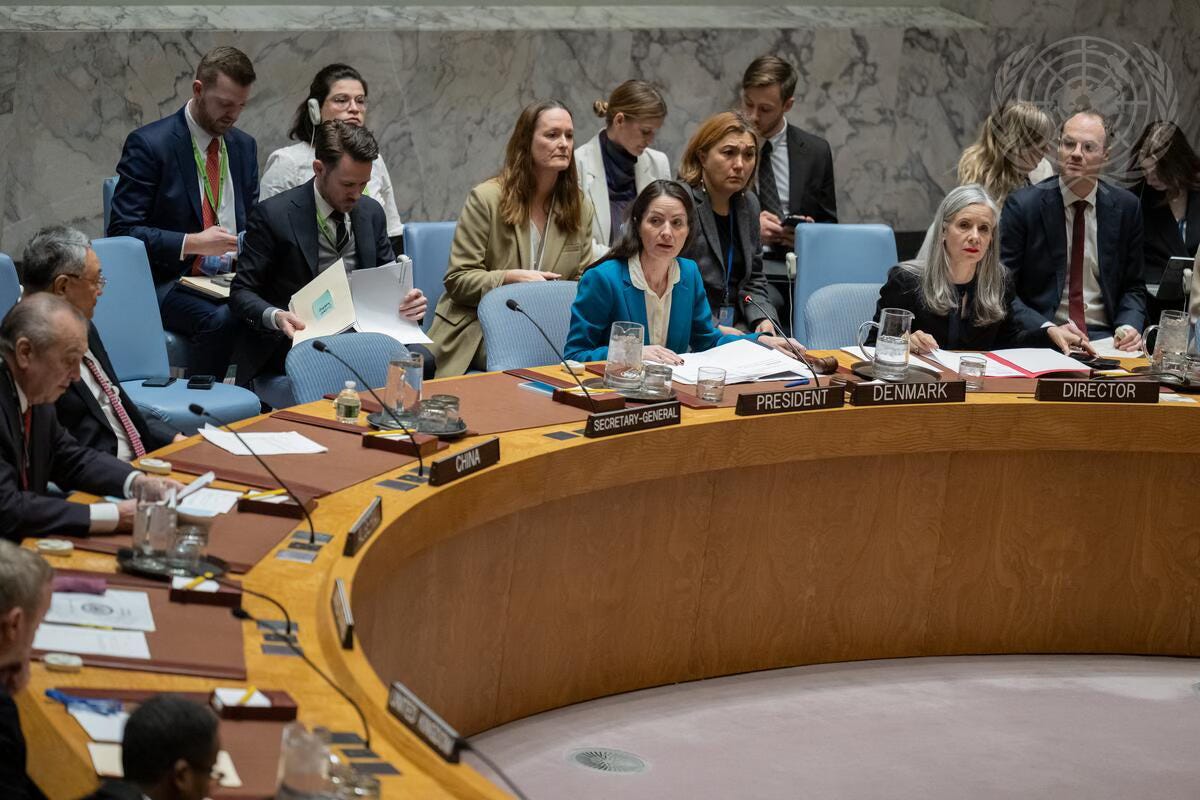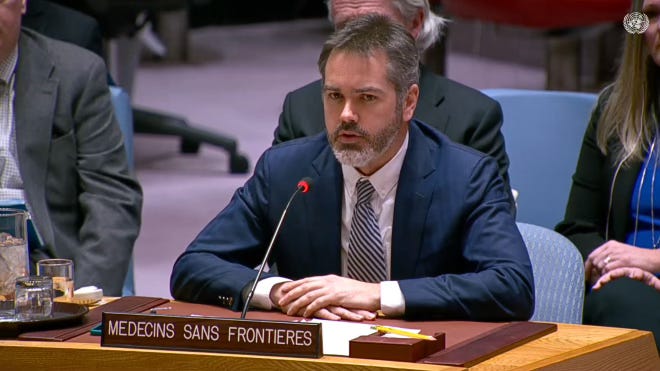UN Security Council confronts Sudan’s worsening crisis
UNICEF and Doctors Without Borders detail immense challenges

The United Nations Security Council convened on Thursday, March 13, 2025, for a meeting to address the escalating crises in both Sudan and South Sudan. The session featured urgent briefings from senior UN officials and humanitarian leaders who detailed the deteriorating situations in both nations, emphasizing the need for immediate international intervention.
Catherine Russell, Executive Director of UNICEF, described the crisis in Sudan as the worst humanitarian disaster in the world today, noting that after nearly two years of war, Sudan’s economy, infrastructure, and social services systems are “near collapse.”
She added, “We estimate that nearly two thirds of Sudan’s total population — more than 30 million people — will require humanitarian assistance this year. 16 million of them are children — and they are paying a terrible price.
“Famine is occurring in hotspots in at least five locations in Sudan, with an estimated 1.3 million children under five living in these areas. Over 3 million children under five are at imminent risk of deadly disease outbreaks, including cholera, malaria, and dengue, due to a failing health system.
“16.5 million school-aged children, nearly an entire generation, are out of school.”
Russell also warned that her agency has received reports of grave violations against children, including forcible recruitment by armed groups, deaths and injuries due to shelling, airstrikes, and fighting, and sexual violence.
Russell called for more efforts to document cases of violence and sexual violence, calling this a “a critical step towards justice and remedy.” She cautioned, however, that “humanitarian actors, Sudanese civil society, and local volunteers face threats for denouncing or documenting human rights violations.”
Meanwhile, Christopher Lockyear, Secretary-General of Doctors Without Borders (MSF), condemned the warring parties for their disregard for civilian life: “The war in Sudan is a war on people — a reality that grows more evident by the day. The Rapid Support Forces, the Sudanese Armed Forces, and other parties to the conflict are not only failing to protect civilians — they are actively compounding their suffering.”
“Violence against civilians is driving humanitarian needs. This is not a mere byproduct of the conflict – it is central to how this war is being waged across Sudan, a war being further fueled from the outside.”
— Christopher Lockyear, MSF Secretary General
“The Sudanese Armed Forces have repeatedly and indiscriminately bombed densely populated areas. The RSF and allied militias have unleashed a campaign of brutality, marked by systematic sexual violence, abductions, mass killings, the looting of humanitarian aid, and the occupation of medical facilities. Both sides have laid siege to towns, destroyed vital civilian infrastructure, and blocked humanitarian aid.”
Lockyear urged the Security Council to establish a concrete mechanism to ensure aid reaches those in need without obstruction from armed groups.
Several Council members expressed deep concern over the briefings. The representative from Denmark described them as "horrifying and alarming," adding, “It should serve as a collective and urgent wake up call.” Greece's representative echoed these sentiments, calling for accountability for those responsible for human rights abuses. "There can be no lasting peace without justice," the Greek delegate asserted.
Meanwhile, the United States announced it had approved a waiver to resume emergency aid to Sudan, including food, medicine, and shelter. However, no specific figures were provided, and concerns remain about whether the aid will be sufficient.
While many countries urged swift humanitarian intervention, China and Russia stressed the importance of Sudan’s sovereignty. They said aid organizations must operate apolitically and under guidance from the national authorities.
Lockyear, the MSF Secretary-General, criticized restrictions on aid, appealing to Council members to address restrictions on the humanitarian aid system in Sudan, which is paralysed by bureaucratic delays, insecurity and political obstruction:
“[The war’s] devastating impacts are compounded by restrictions on humanitarian access whether deliberately imposed or the result of bureaucratic paralysis, insecurity, or the breakdown of governance and coordination.
“We have seen some progress on some fronts: cross-border access to Darfur through Adre; improved visa processing for international staff; the opening of specific airstrips for humanitarian flights in Dongola and Kassala.
“However, the gains remain negligible compared to the overwhelming scale of needs. Despite the clear urgency of the situation, the delivery of humanitarian assistance in Sudan remains exceedingly and, in some cases, deliberately complex.
“Securing travel permits remains challenging, crossline access requires grueling negotiations, and despite prior agreements, vital UN humanitarian hubs in Darfur remain blocked.
“In RSF-controlled areas, the armed group and its affiliates have arbitrarily delayed aid convoys – sometimes for weeks – and imposed unjustifiable tolls and taxes. To transport one 60-ton consignment of humanitarian assistance from N’Djamena in Chad to Tawila in North Darfur costs a staggering $18,000, over a third of which must be paid on the road. Through the Sudanese Agency for Relief and Humanitarian Operations or SARHO, the Rapid Support Forces are imposing crippling bureaucratic hurdles.
“Aid organizations trying to deliver aid in RSF-controlled areas face an impossible choice: comply with SARHO’s demands to formalize their presence and risk expulsion by the authorities in Port Sudan, or refuse and have their operations shut down by SARHO. Either way, lifesaving assistance hangs in the balance.
“Assertions of sovereignty cannot continue to be weaponized to restrict the flow of aid. Aid and aid agencies cannot continue to be exploited to derive legitimacy.”
The Security Council also turned its attention to South Sudan, where the peace process remains fragile. UN officials have highlighted ongoing delays in implementing key provisions of the Revitalized Agreement on the Resolution of the Conflict in the Republic of South Sudan (R-ARCSS), which was signed in 2018. Persistent intercommunal violence, humanitarian access restrictions, and economic instability continue to hinder progress.
Council members emphasized the need for South Sudanese leaders to demonstrate political will and commitment to fully implement the peace agreement and called for sustained international support to ensure lasting peace and stability in the region.
As the meeting concluded, the Security Council members reiterated their commitment to supporting peace efforts in both countries. The Security Council's deliberations highlighted the complex dynamics of the conflicts in Sudan and South Sudan, emphasizing that a multifaceted approach involving humanitarian aid, diplomatic engagement, and accountability measures is essential to alleviate suffering and pave the way for lasting peace in the region.
Want a better handle on what’s happening in Sudan and South Sudan? Sign up to receive 2-4 weekly emails containing maps, videos, fact-based reporting, and incisive insights from an independent perspective.
African Union condemns ‘parallel government’
The African Union's Peace and Security Council (PSC) has issued a condemnation of the Rapid Support Forces (RSF) and their allies for announcing a parallel government in Nairobi. In a statement released on March 11, 2025, the PSC expressed deep concern that such actions could lead to the partitioning of Sudan, thereby threatening its territorial integrity.
The PSC called on all member states and the international community to refrain from recognizing or supporting any parallel government or entity attempting to govern any part of Sudan's territory or institutions. The Council emphasized its commitment to Sudan's unity and sovereignty, urging all parties to engage in constructive dialogue to resolve the ongoing crisis.
The European Union has also voiced strong opposition to the declaration of a parallel government in Nairobi. In a statement dated March 11, 2025, the EU emphasized its commitment to Sudan's unity and territorial integrity. The EU reiterated the necessity of an inclusive, Sudanese-led process to restore civilian rule and called on all parties to refrain from actions that could worsen the conflict.
News in Brief
RSF troops attacked villages in Sirba Locality, West Darfur.
RSF troops attacked and looted Al-Khiwai in West Kordofan after the withdrawal of SAF-allied troops, amid rising military tensions in the state.
Sudan's economic collapse has left many men desperate for work. Unemployed youths in South Darfur have flocked to artisanal mining sites.
Libyan authorities have launched a crackdown on foreign migrants, including Sudanese refugees, amid rising anti-migrant sentiment. Raids in Tripoli and Misrata led to numerous arrests, according to Darfur 24. Many refugees in Libya have fled from Sudan’s conflict zones in Darfur, Kordofan, and elsewhere.
Conflict in South Sudan
The IGAD bloc of East African nations on Wednesday called for South Sudan's government to release detained SPLM-IO officials to deescalate mounting tensions between the signatories to South Sudan’s 2018 peace agreement. IGAD leaders held a summit virtually chaired by Djibouti President Ismaïl Omar Guelleh.
The International Committee of the Red Cross has deployed an emergency mobile surgical team to Akobo County Hospital to treat war-wounded patients arriving from Nasir in Upper Nile State, where South Sudan’s army recently clashed with the Nuer ‘White Army,’ which has ties to SPLM-IO.
Tensions are also rising Ulang County, which borders Akobo County and Nasir County. Speaking to Radio Tamazuj on Friday, County Executive Khor Dak Gony said, “The army is advancing towards Ulang, and the White Army is preparing for battle. Many youths are blowing whistles, signaling readiness for conflict.”
Armed youths also clashed with the South Sudanese army (SSPDF) in Unity State, near the border with Sudan. According to the state information minister the youth attacked an SSPDF barracks at Mayom Junction on Thursday morning.
The Ceasefire Transitional Security Arrangement Monitoring and Verification Mechanism (CTSAMVM) held a briefing for reporters in Juba on Thursday, addressing the growing tensions in the country. The chairperson of the ceasefire monitors, Maj. Gen. Yitayal Gelaw Bitew, said, “The combination of the ongoing conflict in Nasir and the continued arrests [of opposition signatories to the 2018 peace agreement] is causing a high level of anxiety among many stakeholders of the revitalized agreement on the resolution of conflict in South Sudan.”


